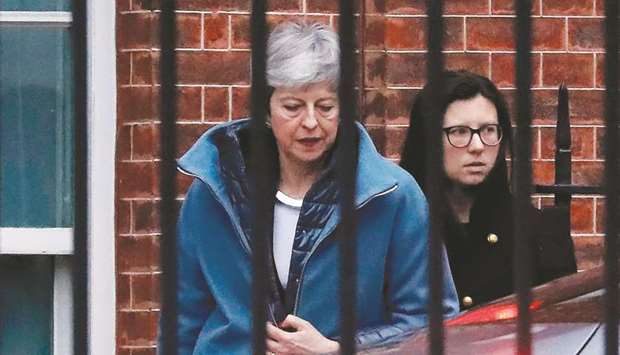
Prime Minister Theresa May leaves from the rear of 10 Downing Street in London yesterday.
The EU could approve Britain’s request for a short delay to Brexit but only if British MPs next week vote through the withdrawal deal they have twice rejected, European Council president Donald Tusk said yesterday.
“I believe a short extension will be possible but it will be conditional on a positive vote on the withdrawal agreement in the House of Commons,” Tusk told reporters, a day before leaders were to gather in Brussels for a crucial summit.
Earlier yesterday, May had asked the EU to delay Brexit until June 30 as she scrambled to contain a deepening political crisis, but faced warnings that Britain could still crash out of the bloc in nine days.
The pound plunged on currency markets as European Union leaders and British parliamentarians responded with scepticism to her request.
Exactly 1,000 days on from Britain’s seismic 2016 referendum vote to exit the EU, a divorce deal negotiated by May has been blocked in parliament, leaving the country gripped by uncertainty.
She wants to put back the March 29 exit date to try one more time to get her agreement passed, but said any postponement beyond the end of June would undermine voters’ trust.
However, the European Commission advised EU leaders that it would be preferable to either have a shorter delay to May 23 — when voting begins in European Parliament elections — or a much longer one, until at least the end of 2019.
The other 27 EU leaders must unanimously agree any delay, but commission president Jean-Claude Juncker said it was unlikely that they decide this week unless London sets out a clear plan, suggesting another meeting might be needed next week.
A spokesman for German Chancellor Angela Merkel welcomed London’s “clear request” and said she would “make every effort” to bring about an agreement at the Brussels summit.
But her Foreign Minister Heiko Maas of the junior coalition partner Social Democrats said May’s letter “only pushes the solution further down the road”. And in Paris, French Foreign Minister Jean-Yves Le Drian had a tough message.
“A situation in which May is unable to deliver sufficient guarantees on the credibility of her strategy at the European Council meeting would lead to the request being refused and a preference for a no deal,” he told parliament.
The parliament has been deadlocked for months over Brexit, with MPs unable to decide how to implement the referendum result, and voters themselves are also sharply divided.
But Britain is now in crisis, facing the potentially catastrophic prospect of leaving its biggest trading partner after 46 years with no arrangements in place.
May reluctantly accepted this week that a delay to Brexit was needed, and told MPs yesterday she had written to Tusk.
In a letter starting “Dear Donald...”, May said that the UK was seeking “an extension...to June 30”.
But she was confronted with a barrage of criticism from Brexit supporters who want to leave on March 29 regardless, as well as pro-EU lawmakers who want a longer delay to seek a new strategy.
May faced shouts of “resign”, while opposition Labour leader Jeremy Corbyn accused her of leading Britain into “crisis, chaos and division”.
In her letter, May said she intended to bring her deal back to the Commons “as soon as possible”, arguing that if it passed, she would need the delay until June 30 to implement the treaty.
If the text is rejected a third time, May said MPs would have to decide what happened next.
“As prime minister, I am not prepared to delay Brexit any further than June 30,” she said, in comments interpreted as a hint about her own future. She said delaying any longer would require Britain to hold elections for the European Parliament, which would be “unacceptable”.
After almost two years of talks, May and the EU struck a divorce agreement late last year, but MPs have overwhelmingly rejected it twice.
Her plan to hold a third vote this week was dramatically blocked by parliamentary Speaker John Bercow, who said May could not keep bringing the same deal back to MPs without substantive changes.
